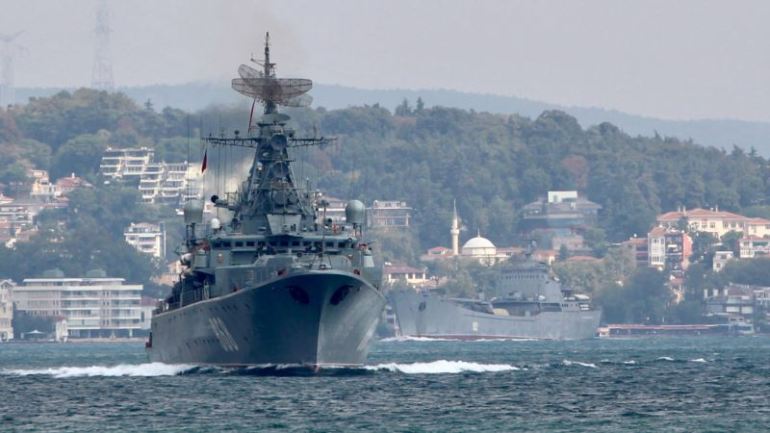Russia is deploying its most powerful group of warships in the Mediterranean Sea since the start of Russian participation in the Syrian conflict in 2015. The move comes amid an escalation of tensions in Idlib province, which is currently under the control of the Syrian rebels.
Russia’s Defense Ministry told the state-run newspaper Izvestiya that the group consists of ten warships and two submarines of the Northern, Baltic, Black Sea fleets, and its Caspian Flotilla. Eight of the ships are equipped with Caliber cruise missiles, and the Russian cruiser named Marshal Ustinov is equipped with an anti-ship missile system called Vulkan.
“Russia’s presence is important to prevent Western countries from hindering efforts to end hostilities as soon as possible. Russian forces act as a guarantor of stability in the region and are not letting a large-scale regional war break out,” said Naji Gabid, a spokesman for the Syrian parliament, in his interview with Izvestiya.
Gabid said that Russia’s positioning of its naval armada in the Mediterranean Sea near Syria is fully in line with international law and has been approved by Damascus.
The Syrian government is reportedly gearing up for a military operation in the northern Syrian region of Idlib, a rebel-held enclave inhabited by nearly three million Syrian people. Some experts believe that Russia’s naval moves are to help support the mission, which is in a region bordering Turkey.
“That’s why eight Kalibr-equipped ships have been deployed to the Mediterranean simultaneously. These systems hit coastal targets effectively and can provide powerful fire support to Syrian troops during a ground operation,” Military expert Dmitry Boltenkov explained, according to TASS.
Officials in Washington, however, are not convinced Russian maneuvering won’t come without a cost.
On August 23, at a meeting in Geneva, U.S. National Security Adviser John Bolton warned his Russian counterpart Nikolai Patrushev about Washington’s readiness to forcefully respond if Syrian President Bashar Al Assad uses chemical weapon to recapture Idlib. A week later, State Department spokeswoman Heather Nauert confirmed Bolton’s statement, saying the U.S. “will respond to any verified chemical weapons use in Idlib or elsewhere in Syria ... in a swift and appropriate manner.”
The tension between the former Cold War foes has grown ever since the Russian Defense Ministry spokesman Major General Igor Konashenkov said that the United States had built up its naval forces in the Mediterranean.
“The United States keeps building up the cruise missile carriers group in the Middle East as part of preparations for another provocation in Idlib Province to be presented as an alleged use of chemical weapons,” Konashenkov said, according to TASS.
The Pentagon has denied the Russian Defense Ministry’s claim regarding an American build-up in the Mediterranean by calling it “nothing more than propaganda.”
The U.S. has carried out two missile strikes against Syrian government forces since Donald Trump has become President of the United States, which were in response to what the U.S. believes were chemical attacks on civilians.







 Azerbaijan and Armenia started the process of demarcation of their border on Tuesday, with the installation of the first border markers based on ge...
Azerbaijan and Armenia started the process of demarcation of their border on Tuesday, with the installation of the first border markers based on ge...
 Armenian sappers commenced on Monday mine-clearance operations in the territories adjacent to the Saint Mary Church in village of Voskepar (Armenia...
Armenian sappers commenced on Monday mine-clearance operations in the territories adjacent to the Saint Mary Church in village of Voskepar (Armenia...
 Iran has refuted reports of alleged damage to Shimon Peres Negev Nuclear Research Centre located southeast of Dimona, Israel, during the recent air...
Iran has refuted reports of alleged damage to Shimon Peres Negev Nuclear Research Centre located southeast of Dimona, Israel, during the recent air...
 Iran’s Foreign Minister, Hossein Amir-Abdollahian, has labeled a foiled Israeli drone attack in certain parts of the country as a "failure" for Isr...
Iran’s Foreign Minister, Hossein Amir-Abdollahian, has labeled a foiled Israeli drone attack in certain parts of the country as a "failure" for Isr...



